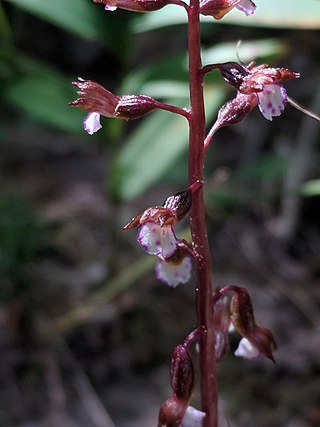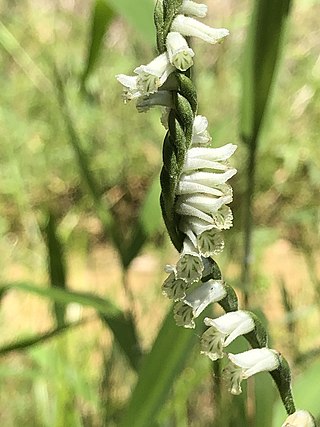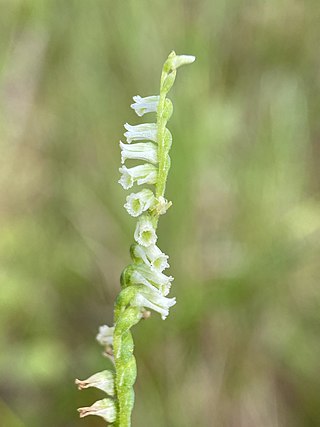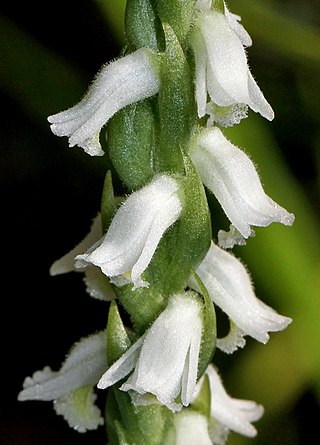
Spiranthes is a genus of orchids in the subfamily Orchidoideae. They are known commonly as ladies tresses, ladies'-tresses, or lady's tresses. The genus is distributed in the Americas, Eurasia, and Australia. The genus name Spiranthes is derived from the Greek speira ("coil") and anthos ("flower"), and was inspired by the spirally arranged inflorescence.

Spiranthes romanzoffiana, commonly known as hooded lady's tresses or Irish lady's-tresses, is a species of orchid. Collected by Chamisso during the Romanzov expedition it was described by him in 1828 and named for Count Nikolay Rumyantsev who financed the expedition. This orchid is native to North America, Ireland and the British Isles.

Spiranthes cernua, commonly called nodding lady's tresses, or nodding ladies' tresses, is a species of orchid occurring from Maritime Canada to the eastern and southern United States. As the common name suggests cernua means "nodding", or "bowed" in Latin.

Spiranthes ochroleuca, commonly called the yellow nodding lady's tresses, is a species of orchid occurring from southeastern Canada to the eastern United States.

Spiranthes porrifolia is a species of orchid known by the common names creamy lady's tresses and western ladies' tresses. It is native to the western United States from Washington and Idaho to southern California. It can be found in moist habitats, such as mountain meadows, swamps, fens, and riverbanks. It is a perennial herb growing from a tuberous root system, reaching a maximum height around 60 cm (24 in). The leaves are mainly located around the base of the erect stem. They are linear or lance-shaped, or sometimes nearly oval. The top of the stem is occupied by the inflorescence, a dense spiral of many flowers. Each flower is somewhat tubular, with an upper and lower lip, and cream to yellowish in color.

Spiranthes infernalis, common name Ash Meadows lady's tresses, is a rare species of orchid known from only four locations in Nevada, all close to one another. The type locale is inside Ash Meadows National Wildlife Refuge, in Nye County approximately 90 miles (140 km) WNW of Las Vegas. The site is a seasonally wet meadow.

Corallorhiza odontorhiza, common name fall coral-root or small-flowered coral-root, is a species of orchid widespread across eastern and central United States, and reported also from Mexico, Central America, Quebec and Ontario. In North America, it occurs in forested areas up to an elevation of 2800 m.

Spiranthes odorata, marsh lady's tresses or common lady's tresses, is a species of flowering plant in the orchid family, native to the southeastern United States, from Texas eastwards and northwards to Delaware. It grows in moist, partially shaded environments with acidic or neutral soil.

Spiranthes ovalis, commonly called the October lady's tresses, is a species of orchid that is native to eastern North America.

Spiranthes lucida, the shining ladies'-tresses, is a species of orchid native to northeastern North America.

Spiranthes arcisepala, the Appalachian ladies' tresses, is a species of flowering plant in the family Orchidaceae. This orchid is native to eastern North America. Long treated as part of Spiranthes cernua the species complex was reevaluated and Spiranthes arcisepala established as a separate species in 2017.

Spiranthes torta, the Southern ladies’ tresses, is a terrestrial orchid native to Florida, Mexico, Central America, the Caribbean Islands and Bermuda.

Spiranthes brevilabris, the short lipped ladies' tresses or Texas lady's tresses is a rare and endangered orchid native to the southeastern United States.

Spiranthes praecox, the grass leaved ladies' tresses, green-vein ladies'-tresses or sometimes giant ladies' tresses is a terrestrial orchid endemic to the United States, growing on the eastern coastal plains and around the Gulf Coast.

Spiranthes sylvatica, the woodland ladies' tresses or pale-green ladies'-tresses is a terrestrial orchid endemic to the United States, very similar in appearance and range to Spiranthes praecox which it had been considered a variation of for a long time.

Spiranthes eatonii, commonly known as Eaton's ladies' tresses is a terrestrial orchid endemic to the United States, closely related to or a variation of Spiranthes lacera.

Spiranthes laciniata, the lacelip ladies' tresses is a terrestrial orchid endemic to the south eastern United States.

Spiranthes triloba, the panther ladies' tresses is a terrestrial orchid endemic to Florida.

Spiranthes casei, or Case's lady's tresses, is a species of orchid native to the northeastern United States and Canada.
Spiranthes igniorchis, or fire ladies' tresses, is a species of orchid endemic to Florida.



















